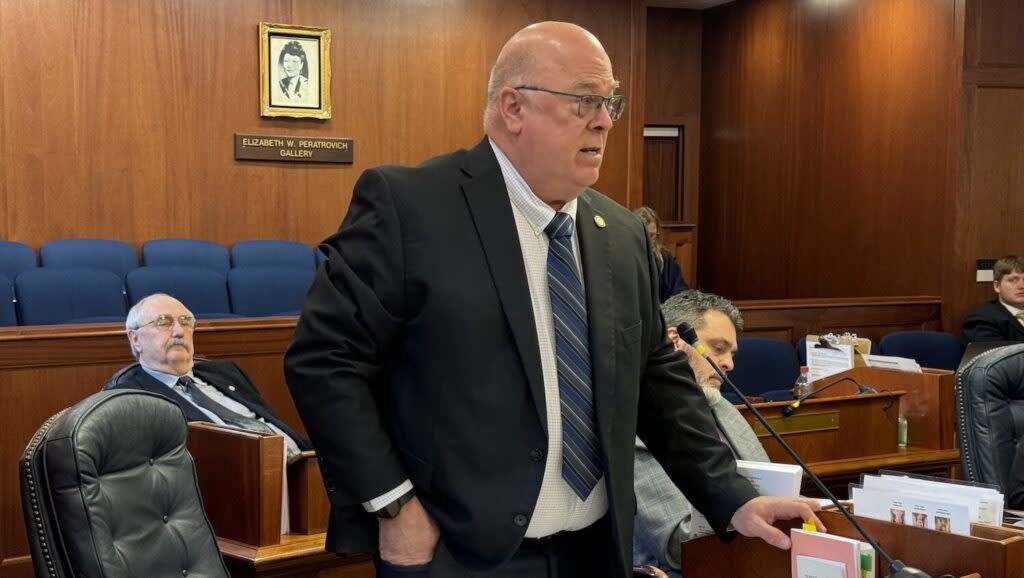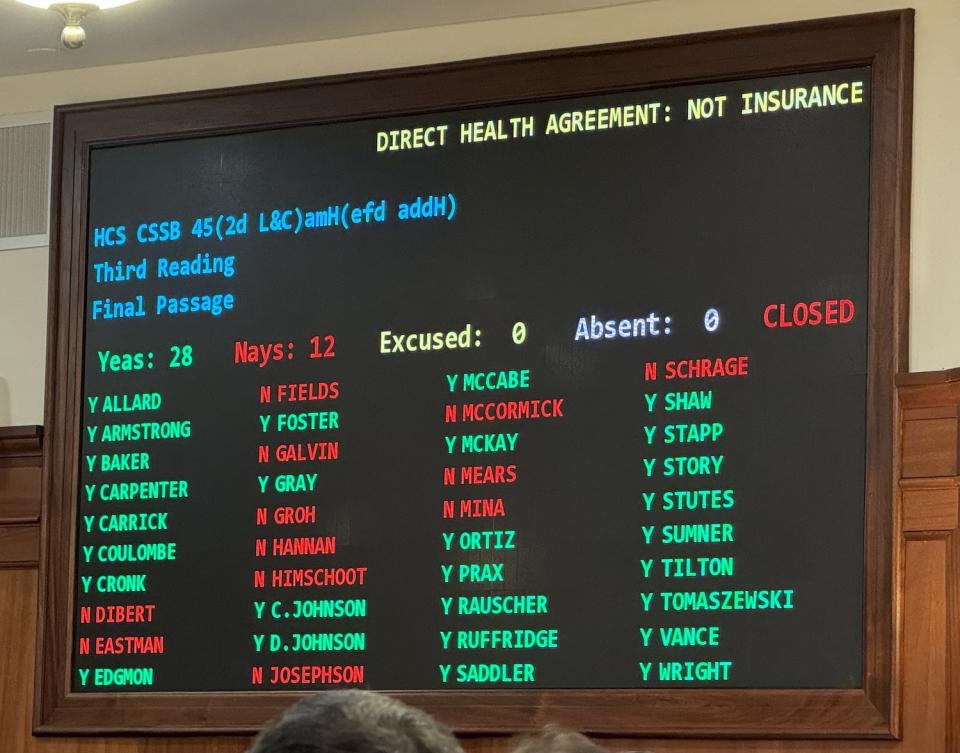Alaska lawmakers OK rules for subscription-style basic health care

Rep. Kevin McCabe, R-Big Lake, speaks in favor of Senate Bill 45 on Monday, April 8, 2024. (Photo by James Brooks/Alaska Beacon)
The Alaska Legislature has voted to approve a health care approach likened to a gym membership.
In a 28-12 vote on Monday, the state House voted to approve Senate Bill 45, which authorizes direct health agreements in the state.
SB 45 clarifies that direct care agreements — effectively a subscription for basic health care from a doctor’s office — aren’t insurance and can’t be regulated as such.
“In Alaska, our insurance laws are drafted so broadly that the legality of these agreements is unclear,” said Rep. Kevin McCabe, R-Big Lake, who carried the bill on the House floor.
Senators passed SB 45 in May 2023, and it’s just the fourth bill this year to gain approval from both House and Senate.

The voting board in the Alaska House of Representatives displays the total votes for and against Senate Bill 45 on Monday, April 8, 2024. (Photo by James Brooks/Alaska Beacon)
Alaska has the highest health-care costs in the nation, and there is a shortage of both specialty care and primary care.
McCabe said the newly authorized agreements are intended to bypass insurance company markups, reducing costs. A patient can subscribe to their local doctor’s office and receive basic care as part of that subscription.
Emergency care or specialty services might not be covered as part of the agreement.
“Direct health care agreements work similarly to a gym membership or other subscription-based services,” McCabe said. “A gym membership can include certain things such as the use of machines, regular visits, but if you want to use tanning beds or attend a Pilates class, you pay an extra fee.”
Rep. Genevieve Mina, D-Anchorage, said she grew up uninsured and sees direct health agreements as a way to meet the needs of people who were unable or unwilling to obtain insurance for basic care.
But she also said she’s not sure that it will help Alaskans who need emergency care and are confronted with large bills as a result.
“And so I wonder if this really is addressing cost issues that people are facing. And additionally, it doesn’t have the same insurance protections for the consumer,” she said.
During debate on the House floor, lawmakers amended SB 45 to say that any health care provider who offers a direct health agreement must have 20 percent of their patients be uninsured or on Medicare, the federal health insurance program for elderly Americans.
Members of the House also added consumer protection language.
But that didn’t satisfy all legislators, including Rep. Zack Fields, D-Anchorage and a cosponsor of some of the successful amendments.
Fields said he’s worried that non-Alaskan private equity firms will buy clinics and offer cut-rate services, making it impossible for Alaska-owned businesses to operate here.
He unsuccessfully attempted to insert a provision into the bill that would have allowed only majority Alaska-owned businesses to offer direct care agreements.
“If we don’t have proper consumer safeguards in place, frankly, it’s all too easy for these parasitic private equity companies to come in and get the revenue while really harming patients,” he said.
Jared Kosin is president of the Alaska Hospital and Healthcare Association, which represents hospitals and existing clinics across the state. He said his organization wasn’t taking a stance on the bill.
“We’ve been pretty strongly neutral on it. We don’t oppose it,” he said.
Speaking before the final vote, McCabe said SB 45 should be viewed as a step forward, but not the final step in addressing the state’s health care problems.
“This bill is not designed to fix all the problems in Alaskans’ healthcare, not by any means,” he said.
SB 45 is being held in the House for a vote to confirm the House’s approval. If approved on reconsideration, the bill will return to the Senate, where lawmakers will be asked to approve the House’s changes.
If adopted, SB 45 will go to Gov. Mike Dunleavy for final approval or veto. If senators don’t approve the changes, a select group of legislators will attempt to negotiate a compromise version.
GET THE MORNING HEADLINES DELIVERED TO YOUR INBOX
The post Alaska lawmakers OK rules for subscription-style basic health care appeared first on Alaska Beacon.

